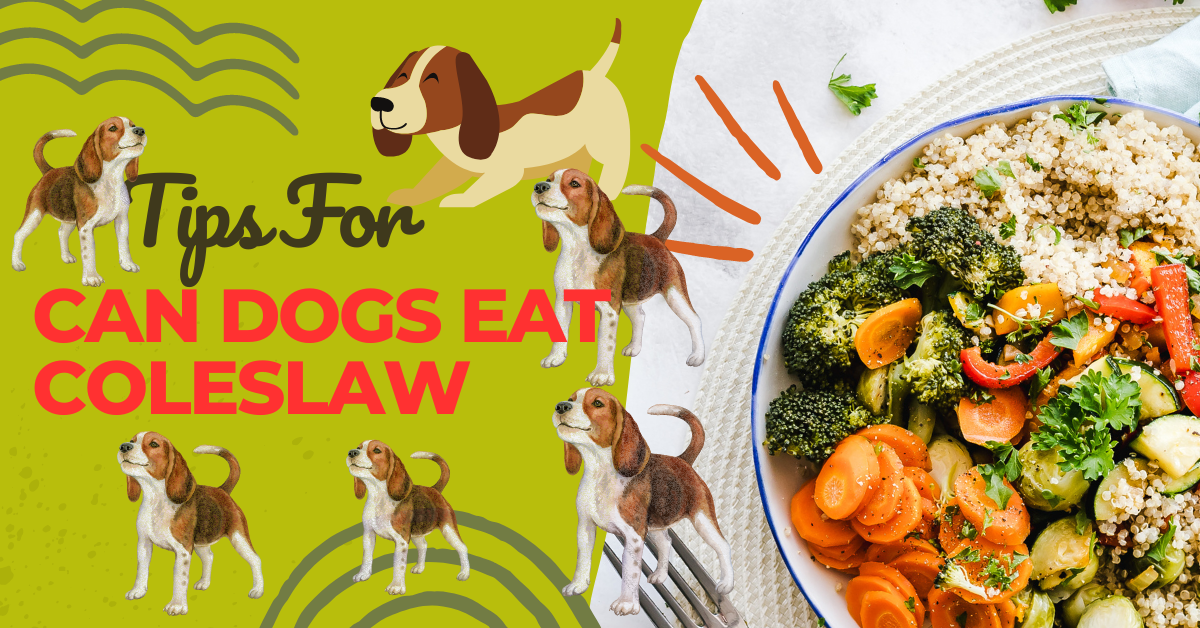Can Dogs Eat Coleslaw? Science Experiment Risks and Benefits
As a dog owner, it’s natural to want to share meals with your Dogs. However, not all human foods are safe for dogs to consume, and it’s important to know which ones can be harmful to their health. Coleslaw is a popular side dish made with shredded cabbage, carrots, and a dressing typically made with mayonnaise, vinegar, and sugar. Many people enjoy coleslaw as a refreshing and crunchy addition to their meals, but can dogs eat coleslaw safely?
In this article, we will explore the question of whether or not coleslaw is a suitable food for dogs to consume. We will conduct a scientific experiment to examine the potential risks and benefits associated with feeding coleslaw to dogs, as well as evaluate the individual ingredients in coleslaw and their effects on canine health.
To conduct our experiment, we will first examine the nutritional content of coleslaw and compare it to the dietary requirements of dogs. We will also consider the potential health risks associated with the ingredients commonly found in coleslaw, including cabbage, carrots, mayonnaise, and sugar.
Additionally, we will discuss the potential benefits of feeding coleslaw to dogs, such as the nutritional value of cabbage and carrots and their potential health benefits. We will also examine the impact of providing coleslaw to dogs with specific health conditions, such as obesity and diabetes.
Can Dogs Eat Coleslaw? Step-by-Step Guide Need to Know
Here, we are going to discuss 6 major topics that you must need to know:
- What is Coleslaw?
- Can Dogs Eat Coleslaw?
- Coleslaw Benefits
- When Is Coleslaw Bad For Dogs?
- What is Coleslaw Made of?
- Healthy Alternatives to Coleslaw
What is Coleslaw?
Coleslaw is a popular side dish that originated in the Netherlands and is now commonly found in many countries worldwide. It is typically made from shredded or finely chopped cabbage mixed with grated carrots and other vegetables such as onions and bell peppers. Coleslaw is usually dressed with a sauce made from mayonnaise, vinegar, and sugar. However, there are many variations of the dressing that can include other ingredients such as mustard, sour cream, or yogurt.
Coleslaw can be served as a side dish with various meals, such as sandwiches, burgers, hot dogs, or barbecues. It is known for its refreshing and crunchy texture and can be a great way to add vegetables to your meal. Coleslaw is also a popular ingredient in many recipes, such as salads, tacos, and wraps.
While coleslaw can be a healthy and tasty addition to your meal, it’s important to note that the nutritional content can vary depending on the ingredients used and the dressing used. Additionally, some ingredients commonly found in coleslaw, such as mayonnaise and sugar, may not suit all dietary needs or preferences.
Can Dogs Eat Coleslaw?
It is generally not recommended to feed coleslaw to dogs. While some of the ingredients, such as cabbage and carrots, may be safe for dogs to eat in small quantities, coleslaw often contains ingredients that are not suitable for canine consumption, such as onions, garlic, mayonnaise, and dressing that may contain ingredients like raisins, grapes, or nuts that are toxic to dogs.
Additionally, coleslaw is often high in fat and calories, which can lead to weight gain and other health issues in dogs if consumed regularly or in large amounts.
If you want to feed your dog a vegetable-based snack, it is best to stick with safe options such as cooked, plain vegetables like green beans, carrots, or sweet potatoes. You should always consult with a veterinarian before introducing any new foods to your dog’s diet to ensure they are safe and appropriate.

Coleslaw Benefits
Coleslaw can provide some health benefits when consumed in moderation and made with healthy ingredients. Some of the potential benefits of coleslaw include:
Nutrient-dense
Coleslaw is typically made with various vegetables, such as cabbage, carrots, and onions, which are all rich in vitamins, minerals, and antioxidants. These nutrients can help support a healthy immune system, improve digestion, and promote overall health.
Low in calories:
Depending on the ingredients and dressing used, coleslaw can be a low-calorie side dish that can help with weight management. Cabbage, which is often the main ingredient in coleslaw, is also low in calories and high in fiber, which can help you feel full and satisfied.
May improve gut health:
Cabbage and other cruciferous vegetables in coleslaw contain prebiotics, which can promote the growth of beneficial gut bacteria. This can improve digestion and may help reduce the risk of certain digestive disorders.
May help reduce inflammation:
Some vegetables used in coleslaw, such as cabbage, contain compounds that may have anti-inflammatory effects. Eating a diet rich in anti-inflammatory foods may help reduce the risk of chronic diseases, such as heart disease and diabetes.
Coleslaw can be a healthy addition to your diet when made with fresh, whole ingredients and a nutritious dressing. However, it is important to be mindful of the ingredients used, as some dressings and additives can be high in sugar, salt, and unhealthy fats.
When Is Coleslaw Bad For Dogs?
Coleslaw can be bad for dogs if it contains ingredients that are toxic to them or if it is high in fat and calories. Here are some specific situations when coleslaw may be harmful to dogs:
Contains toxic ingredients:
Coleslaw often contains onions, garlic, and other ingredients that can be toxic to dogs, even in small amounts. These ingredients can cause damage to a dog’s red blood cells and lead to anemia, which can be life-threatening.
Dressing or mayonnaise:
Coleslaw dressings and mayonnaise are often high in fat and calories, leading to obesity and other health problems in dogs. Additionally, some sauces may contain ingredients that are toxic to dogs, such as raisins, grapes, or nuts.
Too much cabbage:
While cabbage is generally safe for dogs to eat in small quantities, consuming large amounts can cause digestive upset, including gas and bloating. This can be uncomfortable and may lead to more serious digestive issues if consumed regularly.
Allergies:
Dogs can be allergic to certain ingredients in coleslaw, such as cabbage or carrots. Signs of an allergic reaction may include itching, swelling, and digestive upset.
Overall, coleslaw is not recommended for dogs as a regular part of their diet. If you want to give your dog a vegetable-based snack, stick to safe options such as cooked, plain vegetables like green beans, carrots, or sweet potatoes, and always consult with a veterinarian before introducing any new foods to your dog’s diet to ensure they are safe and appropriate for your pet.
What is Coleslaw Made of?
Coleslaw is typically made with shredded or thinly sliced raw cabbage, although other vegetables such as carrots, onion, and bell peppers may be added for additional flavor and nutrition. The vegetables are usually mixed in a bowl with a dressing made of mayonnaise, vinegar, and sugar or honey. Other ingredients such as mustard, celery seed, salt, and pepper may also be added for seasoning.
Here is a basic coleslaw recipe:
Ingredients:
- 4 cups shredded cabbage
- 1/2 cup shredded carrots
- 1/4 cup chopped onion
- 1/4 cup mayonnaise
- 2 tablespoons vinegar
- 1 tablespoon sugar
- Salt and pepper to taste
Instructions:
- In a large bowl, combine the shredded cabbage, shredded carrots, and chopped onion.
- In a separate bowl, whisk together the mayonnaise, vinegar, and sugar until smooth.
- Pour the dressing over the vegetables and toss until evenly coated.
- Season with salt and pepper to taste.
- Cover and refrigerate for at least 30 minutes before serving to allow the flavors to meld together.
Note: This is just a basic recipe, and there are many variations of coleslaw that use different ingredients and dressings
Healthy Alternatives to Coleslaw
If you are looking for healthy alternatives to coleslaw, there are many options to consider. Here are a few ideas:
Greek Salad:
A Greek salad is a fresh and healthy alternative to coleslaw. It is made with a combination of lettuce, cucumber, tomatoes, red onion, feta cheese, and olives, dressed with a simple vinaigrette. It is a low-calorie option that is high in fiber and antioxidants.
Roasted Vegetable Salad:
Roasting vegetables brings out their natural sweetness and can add a depth of flavor to salads. A roasted salad can be made with various vegetables, such as bell peppers, eggplant, zucchini, and sweet potato, tossed with a simple vinaigrette and served over a bed of greens.
Broccoli Salad:
Broccoli is a nutrient-dense vegetable with fiber, vitamins, and antioxidants. A broccoli salad is made with chopped florets, diced red onion, crumbled bacon, and a tangy dressing made with mayonnaise, vinegar, and honey.
Bean Salad:
A bean salad is a protein-packed alternative to coleslaw that is filling and nutritious. It is made with various beans, such as kidney beans, chickpeas, and black beans, mixed with diced vegetables like bell peppers, onion, and tomato, and dressed with a simple vinaigrette.
Quinoa Salad:
Quinoa is a high-protein grain that is gluten-free and packed with nutrients. A quinoa salad can be made with cooked quinoa, mixed with diced vegetables like cucumber, tomato, and avocado, and dressed with a simple vinaigrette.
These are just a few healthy alternatives to coleslaw. Be creative and experiment with different combinations of vegetables and dressings to find a salad you love.
Conclusin: Can Dogs Eat Coleslaw? Science Experiment Risks or Benefits
Based on scientific evidence and veterinary recommendations, dogs should not be fed coleslaw as a regular part of their diet. While some of the ingredients in coleslaw, such as cabbage and carrots, are safe for dogs in small quantities, many coleslaw recipes contain ingredients that are toxic or harmful to dogs, such as onions, garlic, and high-fat dressings.
Feeding dogs coleslaw could lead to digestive upset, obesity, and even life-threatening conditions such as anemia. Additionally, individual dogs may have allergies or sensitivities to certain ingredients in coleslaw, which could cause adverse reactions.
Therefore, it is recommended to avoid feeding coleslaw to dogs and instead stick to safe dog foods that provide proper nutrition and support their health. Always consult a veterinarian before introducing any new food to your dog’s diet. And monitor your dog for any signs of digestive upset or allergic reactions when trying fresh foods.
FAQ’s
It is not recommended to feed coleslaw to dogs, as several of its ingredients can be harmful to them. While cabbage and mayonnaise can cause mild gastrointestinal upset in some dogs, onions and certain seasonings can be toxic and pose more serious health risks.
In general, pickles are not toxic to dogs. They contain some nutritional health benefits, which in theory would make giving them to your pup perfectly fine. However, they are extremely high in sodium and contain ingredients that could be potentially harmful to a dog.
Coleslaw is made with a host of ingredients that may not be good for your cat, including mayonnaise, vinegar, lemon juice, sugar, and more. Also, coleslaw uses raw cabbage, which can be difficult for your kitty to digest. While a tasty side dish for the humans in your pack, your cat should stay away from coleslaw.
Yes, dogs can eat cabbage. It’s actually one vegetable that’s packed with dog-friendly nutrients. However, just like in humans, if your dog overeats cabbage, it can cause them to have an upset stomach, gas, and diarrhea, Dr. Sievert told The Dodo.







